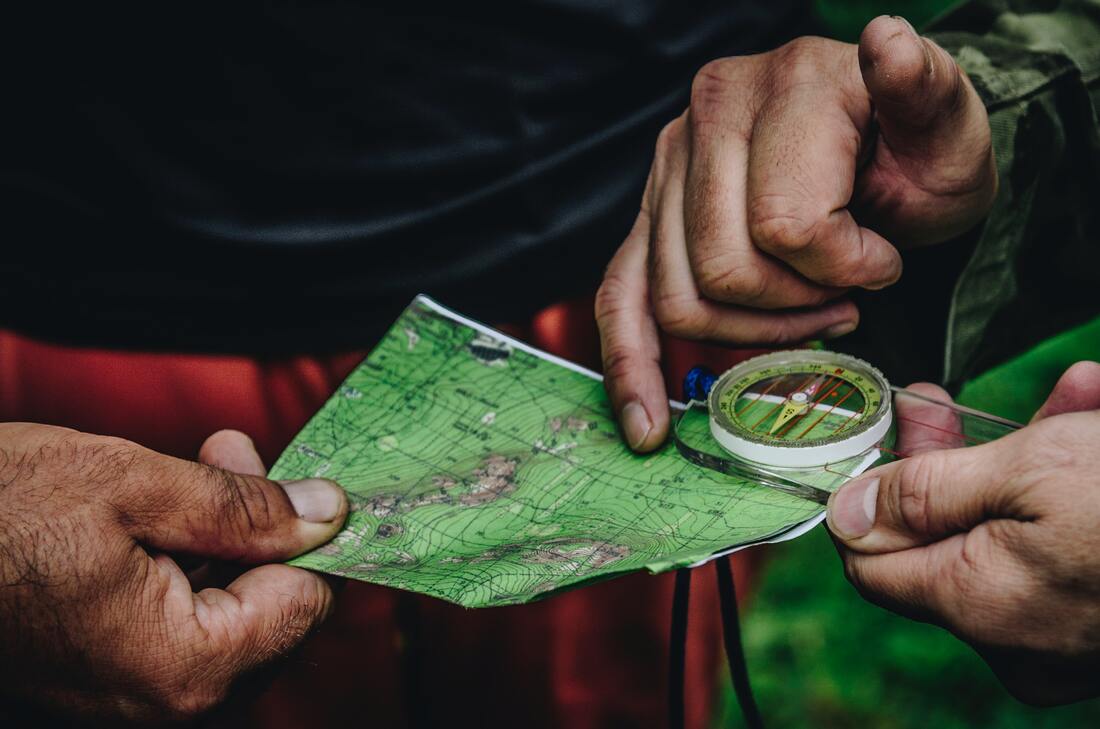by Joel BatesOn a recent, eight-day challenge expedition, the Lord reminded me about making plans. As is the custom on our challenge trips, I gave the group a destination to find, using their maps and compasses. So, they laid their maps on the ground, studied them a while, and came up with a plan. Then, we shouldered our heavy backpacks and set off. Immediately, we had to ford the gently flowing river. I thought this might create some challenge for them since many groups wrestle with finding a convenient passage only to discover that the fastest way across is simply through the water. This group didn’t even pause to consider. They just put on their water shoes and walked across with about as much concern as if they were strolling through a park. I felt encouraged by the progress and even allowed myself to believe that at this rate we would probably reach the destination well before sundown! With the water crossing accomplished, the group trudged up the brambly ridge and headed toward the destination in the next valley to the east. After a short time, we emerged from the woods to encounter a faint, dual-track path. Most groups do not stumble upon the easiest path, but here we were, standing on the trail that would take us directly to the destination. I began wondering if I would need to add some other sort of challenges to the day since the hike was turning out to be a cinch for the participants. Then I watched with confused fascination as they turned the wrong way on the trail and began walking down the hill in the opposite direction from the destination. We were soon thrashing through thick underbrush, heavy forest cover, and stinging nettles. Just when I thought things couldn’t get any worse, we popped through a forbidding thorn thicket and stood on the banks of a river—the river we had crossed a few hours earlier. What a revealing discovery for them! I thought that surely now the group would understand the error of their ways and turn back in the right direction. Then I heard one of them say, “I think we can cross here.” Was I hearing correctly? Were they planning to go back across the river? As facilitators of challenge, we let groups go the wrong way quite often, but we eventually pose some very pointed questions about their plans. The time had definitely come for those questions. “Hey group,” I said. “Can you show me where we are on the map?” They produced their map, and to my surprise, they pointed to our exact location! So, I followed with, “Do you remember where the destination is?” Again, they astonished me by pointing directly to it! They knew full-well where they were and where the destination was. What didn’t add up was why they continued going in the wrong direction! I asked them to explain in more detail their plan. Indicating the mouth of a creek on the map, they confidently said, “We have to get to this creek. It will probably take us right to the destination.” Grudgingly, I asked, “But is that your destination?” Ignoring my question they continued describing their lavish strategy of travel in great methodical detail. “We need to cross the river here, so we can find easier terrain on the other side. Then we will go a few hundred yards and cross the river back until we come to some cliffs. We will have to cross back over the river and go a little further and finally cross back over right at the mouth of this creek.” They smiled with satisfaction at the conclusion of their scheme. “But where is your destination?” I asked unimpressed. They looked at me incredulously, “Well, it’s over here,” again indicating the exact spot. We were nowhere near the destination, heading in the wrong direction on a course that could put us in danger! “If you know where you are, and you know where the destination is, then why are you going the wrong way?” I asked, expecting them to see the obvious. They blinked, wiped the sweat from their brows, and with clear irritation replied, “This is the plan. We made a plan, and we are sticking to it.” As I considered their folly, I had to admit that in real life, I often make the same mistake. Planning is not the problem. Putting our plan ahead of the Lord’s plan is the problem. Jeremiah 29:11 says, “For I know the plans I have for you, declares the LORD, plans for welfare and not for evil, to give you a future and a hope.” How often do we really trust in the Lord’s plans? He is rarely carrying them out according to our schedule and seldom according to the way we imagine. Paul reminds us in Ephesians 3:20 that God is at work in “exceedingly, abundantly more powerful ways than we can ask or imagine.” That’s a pretty powerful plan. In fact, I cannot fathom its greatness.
Despite this truth or maybe because of it, I find myself regularly doing one of two things: going about life according to my plan or running ahead of God, tricking myself into believing that to keep in step with Him means to go faster and work harder. I often picture walking with Jesus through life and suddenly realize that I’ve gone on ahead of Him while He patiently waits on a park bench, simply enjoying the fresh air of freedom. “Come on, Jesus!” I say in my head. “We’re falling behind!” But the God of the universe is never behind schedule. He’s never in a rush, and He always has a plan. Proverbs 19:21 is a helpful reminder which says, “Many are the plans in the mind of a man, but it is the purpose of the LORD that will stand.” When you consider your best laid plans, do you lay them out before the Father and ask Him if they are part of His plan? Are your plans simply to rush ahead with the steady stream of worldly traffic? Are your plans of the flesh and not of the Spirit? Are you so caught up in your own plans that you’ve forgotten about the destination? Maybe it’s time for a redirect. Maybe it’s time to sit and rest at the Fathers feet. Maybe it’s time to submit your plans to God and set a course for a new destination, His way.
2 Comments
|
Come along side us as we journey in and out of the wilderness, discovering our Creator in creation.
Archives
July 2024
Categories |
Contact Us
|
|


 RSS Feed
RSS Feed

